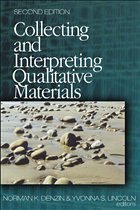Main description:
The second edition of the paperback series of the Handbook of Qualitative Research is virtually all new. Over half of the authors from the first edition have been replaced by new contributors - there are 33 new chapter authors or co-authors. There are six totally new chapter topics, including contributions on: queer theory, performance ethnography, testimonios, focus groups in feminist research, applied ethnography, and anthropological poetics. All returning authors have substantially revised their original contributions, in many cases producing a totally new and different chapter.
This third volume, Collecting and Interpreting Qualitative Materials, considers the tasks of collecting, analyzing, and interpreting empirical materials, and comprises the Handbook's Parts Four (`Methods of Collecting and Analyzing Empirical Materials') and Five (`The Art of Interpretation, Evaluation, and Presentation').
Collecting and Interpreting Qualitative Materials introduces the researcher to basic methods of gathering, analyzing and interpreting qualitative empirical materials. Part One moves from interviewing to observing, to the use of artifacts, documents and records from the past; to visual, and autoethnographic methods. It then takes up analysis methods, including computer-assisted methodologies, as well as strategies for analyzing talk, and text. Esther Madriz reads focus groups through critical feminist inquiry, and Erve Chambers discusses applied ethnography.
Review quote:
...
This book is a must for anyone teaching, or wishing to better understand, qualitative research . . . This handbook is destined to be a classic text in the field of qualitative research that belongs on every student's and researcher's bookshelf.
. HARVARD EDUCATIONAL REVIEW
Table of contents:
1. Introduction - Norman K. Denzin and Yvonna S. Lincoln
I. METHODS OF COLLETING AND ANALYZING EMPIRICAL MATERIALS
2. The Interview: From Structured Questions to Negotiated Text - Andrea Fontana and James H. Frey
3. Rethinking Observation: From Method to Context - Michael V. Angrosino and Kimberly A. Mays de Perez
4. The Interpretation of Documents and Material Culture - Ian Hodder
5. Reimagining Visual Methods: Galileo to Neuromancer - Douglas Harper
6. Autoethnography, Personal Narrative, Reflexivity: Researcher as Subject - Carolyn Ellis and Arthur P. Bochner
7. Data Management and Analysis Methods - Gery W. Ryan and H. Russell Bernard
8. Software and Qualitative Research - Eben A. Weitzman
9. Analyzing Talk and Text - David Silverman
10. Focus Groups in Feminist Research - Esther Madriz
11. Applied Ethnography - Erve Chambers
II. THE ART AND PRACTICES OF INTERPRETATION, EVALUATION, AND REPRESENTATION
12. The Problem of Criteria in the Age of Relativism - John K. Smith and Deborah K. Deemer
13. The Practices and Politics of Interpretation - Norman K. Denzin
14. Writing: A Method of Inquiry - Laurel Richardson
15. Anthropological Poetics - Ivan Brady
16. Understanding Social Programs Through Evaluation - Jennifer C. Greene
17. Influencing the Policy Process With Qualitative Research - Ray C. Rist
The second edition of the paperback series of the Handbook of Qualitative Research is virtually all new. Over half of the authors from the first edition have been replaced by new contributors - there are 33 new chapter authors or co-authors. There are six totally new chapter topics, including contributions on: queer theory, performance ethnography, testimonios, focus groups in feminist research, applied ethnography, and anthropological poetics. All returning authors have substantially revised their original contributions, in many cases producing a totally new and different chapter.
This third volume, Collecting and Interpreting Qualitative Materials, considers the tasks of collecting, analyzing, and interpreting empirical materials, and comprises the Handbook's Parts Four (`Methods of Collecting and Analyzing Empirical Materials') and Five (`The Art of Interpretation, Evaluation, and Presentation').
Collecting and Interpreting Qualitative Materials introduces the researcher to basic methods of gathering, analyzing and interpreting qualitative empirical materials. Part One moves from interviewing to observing, to the use of artifacts, documents and records from the past; to visual, and autoethnographic methods. It then takes up analysis methods, including computer-assisted methodologies, as well as strategies for analyzing talk, and text. Esther Madriz reads focus groups through critical feminist inquiry, and Erve Chambers discusses applied ethnography.
Review quote:
...
This book is a must for anyone teaching, or wishing to better understand, qualitative research . . . This handbook is destined to be a classic text in the field of qualitative research that belongs on every student's and researcher's bookshelf.
. HARVARD EDUCATIONAL REVIEW
Table of contents:
1. Introduction - Norman K. Denzin and Yvonna S. Lincoln
I. METHODS OF COLLETING AND ANALYZING EMPIRICAL MATERIALS
2. The Interview: From Structured Questions to Negotiated Text - Andrea Fontana and James H. Frey
3. Rethinking Observation: From Method to Context - Michael V. Angrosino and Kimberly A. Mays de Perez
4. The Interpretation of Documents and Material Culture - Ian Hodder
5. Reimagining Visual Methods: Galileo to Neuromancer - Douglas Harper
6. Autoethnography, Personal Narrative, Reflexivity: Researcher as Subject - Carolyn Ellis and Arthur P. Bochner
7. Data Management and Analysis Methods - Gery W. Ryan and H. Russell Bernard
8. Software and Qualitative Research - Eben A. Weitzman
9. Analyzing Talk and Text - David Silverman
10. Focus Groups in Feminist Research - Esther Madriz
11. Applied Ethnography - Erve Chambers
II. THE ART AND PRACTICES OF INTERPRETATION, EVALUATION, AND REPRESENTATION
12. The Problem of Criteria in the Age of Relativism - John K. Smith and Deborah K. Deemer
13. The Practices and Politics of Interpretation - Norman K. Denzin
14. Writing: A Method of Inquiry - Laurel Richardson
15. Anthropological Poetics - Ivan Brady
16. Understanding Social Programs Through Evaluation - Jennifer C. Greene
17. Influencing the Policy Process With Qualitative Research - Ray C. Rist
